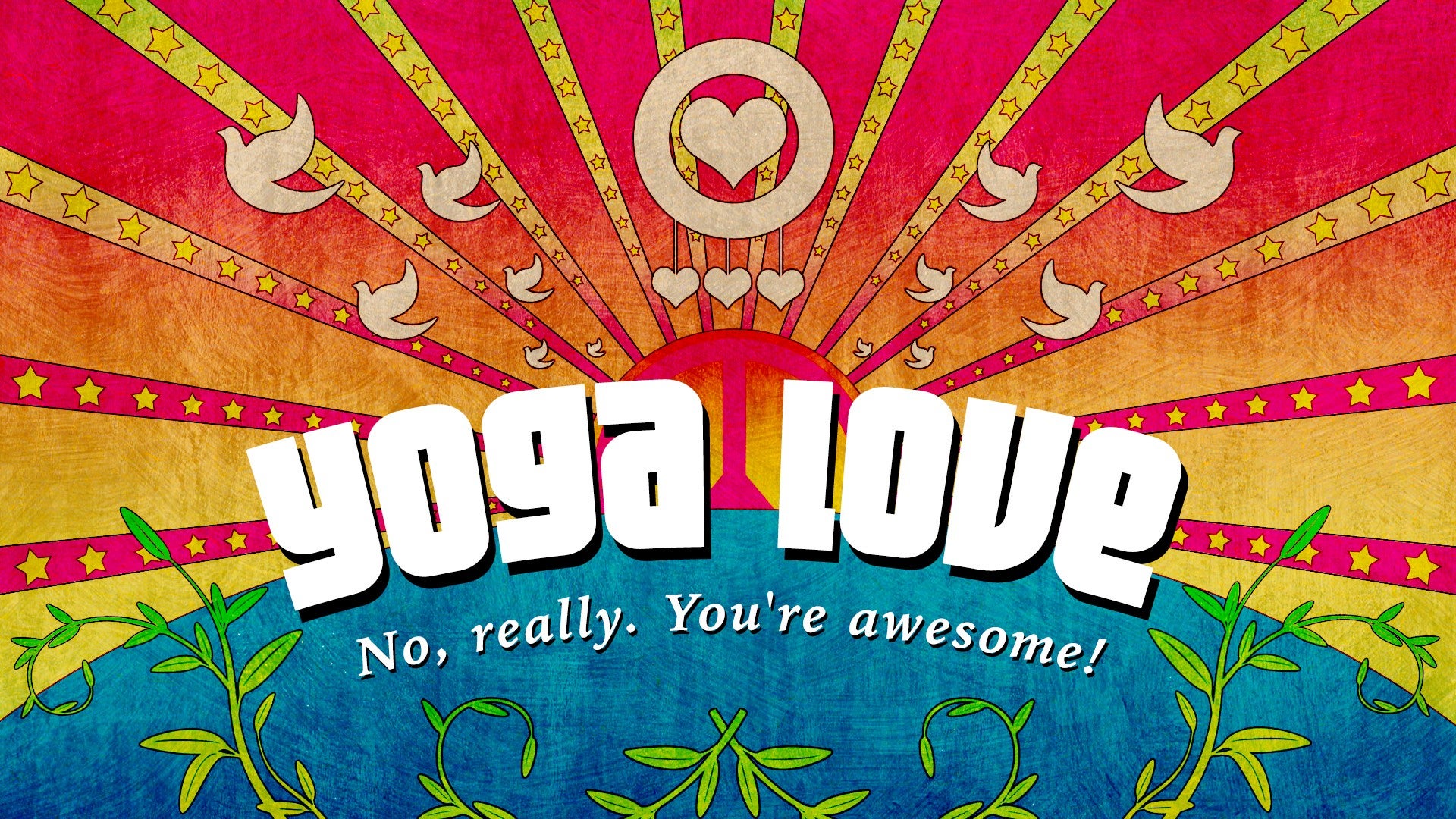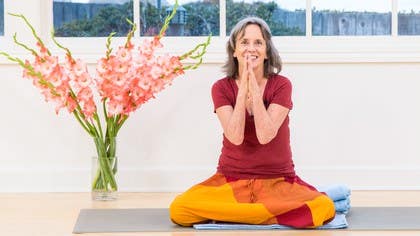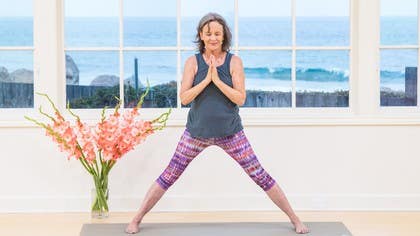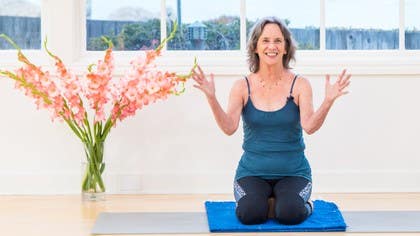Description
About This Video
Transcript
Read Full Transcript
(waves rolling) So, recently I had an opportunity to go the south of India and join a group from the One World Academy. There were two teachers there, Krishna Ji and Preetha Ji whose teachings, I discovered, where extremely simple and very profound. And although they were talking about our lives as a whole, immediately what hit me was that the very teachings they were imparting had so much to do with, or so much, um ability, I guess, to help me further move into this whole conversation about body image. The way that they talked about suffering, I realized was exactly what I was doing when I got stuck in this whole process of judgmental thinking about my body. And what they say, is basically that there are two types, two states of being.
Suffering, and not suffering. We suffer when we get stuck in obsessive self-centric thinking. That means, for example, if I have if I have an argument with my spouse, and I'm really angry, now in my mind I'm angry because he did something that pissed me off, and so it's really, in my mind, all about him, because he's made me angry. But as they started to explain it, as we started to work with it, I realized that obsessively thinking about what I should have said, who said, he said, she said, what I should have done keeps me in this burning sense of anger long after it was useful, if it was ever useful at all and it allows me to approach and to look at my spouse from this sense of anger, from this sense of reaction. In the same with being hurt, the same with being irritated, or grief stricken, or sad it's the sense of being obsessively thinking about it and not being able to then connect from a place of compassion, kindness, and understanding.
I'm connecting, I'm lashing out from hurt, anger, irritation, whatever those negative emotions are. So I got to thinking about how often we do that in the body. How often I approach my own body from a sense of, really from an obsessive, self centric, thinking. So instead of looking at my body as, with kindness, compassion, looking at it's usefulness I start to separate it. I get angry.
I get frustrated because I'm not losing weight fast enough, or I can't seem to tone my arms, and I have this arm stuff going on, or I can't seem to look younger, whatever it is. Whatever my charge is against my body that becomes my obsession. And from that obsession, from that constant judgement I lose sight of the whole, and I begin to get smaller and smaller, and my attention becomes more and more focused on what doesn't work, what I wish were different, what I feel has betrayed me, what I feel is wrong with me. And what happens when I do that is I assume, because I'm in that loop, I assume that everyone is looking at me in the same way. How can I possibly think that Linda is smart, a good teacher, a this or a that, if obviously she has this bum hip, so how can she be a good teacher?
How can she teach me things when she's 20, 30 years older than I am, How can I connect with her, how can I look past her this, that, whatever it is? So my assumption becomes, and my obsessive thinking becomes such that I include you in the equation. And we all are obsessing about all of my insecurities and all of my faults. We're all in this together. So there's connection, but there's not compassionate connection.
So I begin to define myself by what I dislike and I fail to see my gifts. So the smaller and the more, the more I start to contract around those places in my body, first of all, the more I heap judgement on them, the more they shrink away from me. Mr. Iyengar says that we do the body a great violence when we overextend on one part of the body, we over-connect with our flexibility, our this or that, but we also do great parts of the body, not only that we ignore and push away, but also by the way we speak about them. So our language around what we're obsessively unhappy with further, further allows that part of of the body to feel less-than. So, suddenly I have this bad hip, what it says to my hip is "You're worthless, you can't do anything, "you're not doing what I want you to do, "so I'm not going to give you the attention "that you need to heal, "I'm going to put you over here, "I'm going to concentrate on this.
"Awesome I can touch my knee with my nose over on this side. "I'm loving this. "Over here, I can barely bend without you hurting me. "So you know what? "I'm just going to move over here." So all of my breath, all the healing energy that I have, all of the loving attention comes away from the parts that I don't like and moves to those fragments, those pieces that I do like.
According to Mr. Iyengar we do a great deal of damage to both parts actually. So when I hear students, and when I hear myself say, "Oh I have this bum shoulder." or, "God, what is wrong with my hip." or,"You know what? "This knee used to work a whole lot better." My invitation, if you will, to myself and to others is how can we rephrase that? What does this hip need from me today? Can I approach the parts of me that I've been nattering about and complaining about, can I shift that and say, what do you need today?
What do you need from me to feel a little bit more welcome? To feel like the muscles around you can maybe release a little bit, feel a little bit more safe and begin to move and begin to investigate what's there, and maybe together we can begin to heal. But I find that a really difficult endeavor when I start thinking about the parts of my body that I want to change. Like the wrinkles on my face, or maybe there's more weight than you want around your middle, or your belly, or your chin. It's so much easier to minimize that and say, "Oh my god, I just have to fix you.
"and as soon as I fix you, everything's going to be better." My world's going to expand, I'm going to be nicer, I'm going to be kinder, people are going to like me more, if I can just fix this. So what I began to see after spending this time with Krishna Ji and Preetha Ji, is that I've been equating challenges with suffering. My challenge is, for example, if my hip were having some difficulties, my challenge is that I've injured my hip. That's a challenge, there's no charge around that, it's just, yeah, here's this hip, that's really pretty painful right now, a challenge I suffer when I heap layers of judgement onto that. My hip is hurting because, why did I think I could do that pose in the first place?
Why did I think I was flexible? When I'm really no longer flexible must mean I can no longer do this because, this, this, this. I'm too fat, I'm too old, I'm too this, I'm too that. So that challenge suddenly becomes a way that I suffer. I found that really interesting because I found that if I could separate the challenge and meet it as an external thing then I'm way more likely to be kinder and more patient with that hip, or that shoulder, or whatever that challenge is and meet it.
That was really an interesting connection for me, because I was able to see that there are variety of places in my own body where I do that. And i think, can I now see that this is a challenge to meet? And to meet in partnership. So it's not my mind going, "Oh, my gosh, "I can't believe this is happening, this is happening." It's no longer an argument, so I'm not approaching my challenges from this obsessive self-centric thinking that makes them negative, and brings up negative emotions that I then connect with various parts of my body. I can come in and look.
So it's like meeting you, looking at you, really looking, and saying, "I understand. "I can meet you with my mind, my body, and my breath, "I can meet, and let's have a conversation" So I can do that in my body if I can see these as challenges and say, "Oh, alright, what do you need, what can I do, "let's investigate, let's move into the body with love." Which makes me remember this awesome quote, in a book that Milan Kundera wrote, where he says, "Love is investigation." And for me it's also inquiry without judgement, I think that's really what he means. And so, once again, Swami Kripalu joins that conversation when he says that whenever we judge ourselves we break our own hearts, and that's precisely what happens when we rip apart the body and we decide what we like, what we don't like, what we'll accept, what we'll reject. So as I began thinking about that I began to notice how small I get when I get caught up in the self judgement. I don't want people, necessarily, to look at me.
And so, when that happens, it's so easy to move away from connection and feel separate, feel contracted to feel separate. And that's not a healthy, it's not a happy place to be. So how can I, how can yoga, and meditation help me to move from contraction to expansion, from separation to connection. And I think that as long as we look at practice as this authentic and loving investigation we can move back to wholeness. One of the reasons that I really believe yoga can help us is because yoga, yoga offers a safe way in, in a way.
So you're on your mat, and your mat becomes the laboratory for your life. But it's only this big, and you only have to step on it when you feel ready. And sometimes in that inquiry, particularly if it's a charged one, I may only spend five minutes on my yoga mat, touching in on and moving into the body and kind of looking at what might be true. And if it feels too charged for me, I just return to my breath, sit a bit, and sometimes even just go about my day, and so yoga becomes a safe place for me to explore, and to see what's there, and to see what my body has to say, and to also see what my response is. Also, when I'm really charged and I can't move beyond it, so when I really get stuck in that excessive, self-centric thinking, one of the things that works for me is cultivating the opposite.
And that's a concept that, it's a pretty central concept in the Yoga Sutras potentially. Which is clearly the, sort of the Bible, if you will, of yoga practice. What he says is to just play with that sense of opposites. If I'm stuck in hatred, what would it be like to entertain love in that same situation? If I'm stuck in self loathing, can I switch that and feel a sense of tenderness, a sense of kindness.
Just playing with it back and forth. I might not be able to stay there too long but what I've come to understand is it's possible. It might one of these things, like for me, sometimes it's too fraught, I might have -- (coughs) Excuse me, I might have a feeling about a challenge in my body. And I'm so over it, and I'm so angry, and I'm so, whatever that is. So I try to touch in and I think, "I can't do this, I can't do this." So I might bring my awareness inside and get close.
So if I'm struggling with this hip, and I keep bringing up this hip because it took me six months after a hip injury to sit cross legged. Instead of understanding that it was an injury, I began to question my ability to teach, my ability to practice, my ability to be in this environment, all because I had gotten a hip injury, at a totally unrelated to yoga event, and that one incident made me rethink, and blame, and judge myself, and feel shame around things that were not the least bit connected to this event. So I would start to try and create a little bit more of a dialog. So first I stopped denigrating it and stopped calling it all sorts of names. And second of all, I would start to enter in and cultivate opposite of loathing and I thought, "Let me just bring a little love and tenderness to it.
"No, not so much." I would start with my knee. And then I would, in my mind, and my breath would soften and massage around the inner thigh, and the IT band on the outside, and I would soften around those, and go, "Oh, okay, hm, this is feeling like okay territory, "I feel like I'm home." And then I'd come to the other side, and say, "How's this side doing?" Bringing breath here, bringing breath over here, bringing breath here... So then I spent some time on my left hip, and I thought, "Oh, this is easy, "this is open, this feels okay. "So what's so hard about making this one over here "feel that she, she's welcome, and that I understsand, "and that we're kind of in this together." So very slowly I would go from left to right, back to left, where I feel safe, over to the right where there's some issues. Until pretty soon, I could dwell here, and say, "What do you need? How can I help?" That was a huge awakening for me, to realize that she was just doing her job, and I didn't allow for healing, and instead I ended up in judgement.
So once I was able to soften around that, the muscles began to soften, actually. I could do things on my mat where I could explore movements, and go, "How about this? How about this? "How do I feel about that?" And come to a better sense of understanding. So what I came to realize was that it was much easier and I was much happier when I could cultivate the opposite of this contracted, self-centric, negative thinking, and dwell in a state of much more expansive awareness. So it wasn't so much that I was thinking about myself that was the problem, but that I was dwelling on these negative emotions that were causing me so much suffering.
And I didn't know how to separate. And because I was stuck there, I had created a sense of separation and detachment, not just from myself, but from others, which caused me to suffer even more. So as I began to play with this sense of generosity, and patience, and loving kindness in the very parts of myself that I had bifurcated, pushed away and locked up, I began to feel, not just more whole, but more expansive. And I felt like I could expand to include all of me. And I could feel my emotions as I opened up more.
I know that Anias Nin said once, she said that life expands and contracts in proportion to our courage. But one of the things that I think yoga teaches us is our world can expand or contract in proportion to how open or closed our hearts are. So for me, this has started this whole body image conversation has moved into a little bit different arena right now. I feel like it's given me the tools to be able to notice my judgments, notice my negative self-centric thinking a little earlier perhaps, and move into connection a little bit more readily. I think it's a process.
(laughs) I think we should still continue the conversation, and continue the exploration. And in the meantime I invite you to practice that sense of moving in and cultivating opposite and see what happens. Namaste.
Yoga Love: Love Your Age
Comments
You need to be a subscriber to post a comment.
Please Log In or Create an Account to start your free trial.










